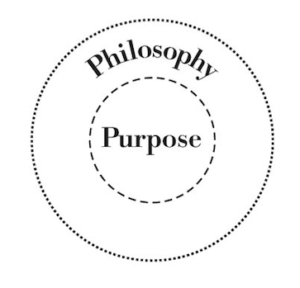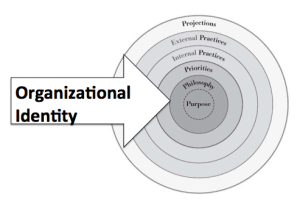Purpose + Philosophy = Organizational Identity
Just as an individual has an identity so too does an organization. That identity defines who the organization is and shapes how members behave. It is central to the experience of employees. And it influences the perceptions of customers.
In short, the formula is simple: Purpose and Philosophy are Organizational Identity.
 As a unit, they are the central attributes that have defined the character of the organization and the cause that it has served over the years.
As a unit, they are the central attributes that have defined the character of the organization and the cause that it has served over the years.
The elements of Organizational Identity serve as the basis for all aspects of the business. How you act must match who you are. And who you are, is based on your core beliefs.
Do you ever change Organizational Identity?
Many ask if the organization’s identity ever changes. The answer is…it depends.
Keep in mind that any significant change to either the Purpose or the Philosophy will have a powerful impact. To clarify, it will impact the organization and its employees.
If your organization’s identity correctly defines the organization and positions it to thrive, then sustaining the identity is the best path.
You see, there is a major risk to changing identity. When you alter either the Purpose or the Philosophy, the organization will feel like a different organization. Loyal employees and loyal customers are connected to these identity attributes. Practices and Projections are aligned with the identity. For many loyal employees, their own identity is intertwined with the organization’s identity.
 Thus, preserve these few core attributes. When possible, companies should avoid monumental change to the identity; that is, unless the company needs this change for survival. If leaders change these attributes, they must understand there are consequences.
Thus, preserve these few core attributes. When possible, companies should avoid monumental change to the identity; that is, unless the company needs this change for survival. If leaders change these attributes, they must understand there are consequences.
This is why times of potential identity change, such as mergers and acquisitions or leadership change, can be difficult. During times of change, firstly, employees will need to understand if the Purpose or Philosophy will change. And, secondly, if it is changing, then they will need to evaluate whether the new core attributes are a fit.
Organizations often seek change to improve and prosper. That is expected. But, incorporating change into the culture is the role of Priorities. Priorities support the identity and enable adaptability and resilience.
Often the change that your company needs the most is to be better at being who you say you are. That is: the Purpose and Philosophy. To sum up, the challenge is to more consistently practice the principles of the organization’s identity.
Key points about Organizational Identity
Together, the Purpose and the Philosophy constitute Organizational Identity.
- To clarify, the organization’s identity is the unique product of its history. Above all, it is not something you can copy from others. Your identity must be authentic.
- It serves as the anchor that grounds an organization and the filter through which it screens its actions.
- A shared identity contributes to employee engagement, a sense of community, and organizational success.
- Any change to the Purpose or the Philosophy can have a major impact on the organization and its employees.
Define your organization’s identity
Problems arise from a lack of clarity and commitment to the identity. When employees see the organization differently, their actions will not be aligned. To clarify, without a shared identity, there is no shared view.
That’s why organization’s must ensure all employees participate in a process for defining the identity. Participation promotes building a shared mindset. And when employees see the identity of the organization as a part of their own identity, then practicing those principles will be a natural process.
Contact Sheila to uncover your organization’s identity.
Now is the time to uncover your organization’s identity. Certainly, Sheila can guide you through the process. Her management consulting firm Workplace Culture Institute is located in Atlanta. And, she services clients globally.
Use the contact form to email Sheila.